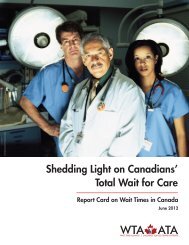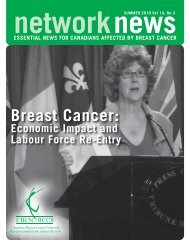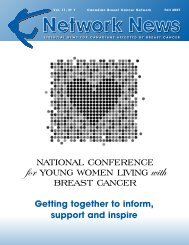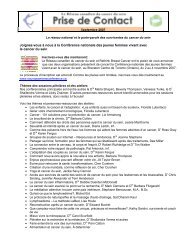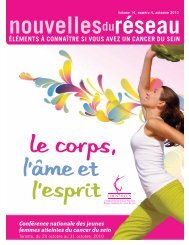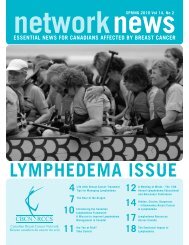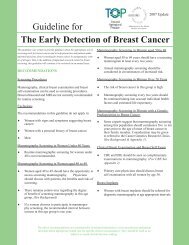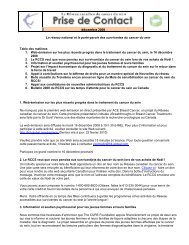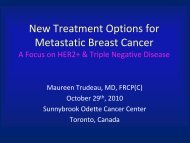Network News - Winter/Spring 2010 - Canadian Breast Cancer ...
Network News - Winter/Spring 2010 - Canadian Breast Cancer ...
Network News - Winter/Spring 2010 - Canadian Breast Cancer ...
You also want an ePaper? Increase the reach of your titles
YUMPU automatically turns print PDFs into web optimized ePapers that Google loves.
process. They discuss their options and<br />
implications of genetic testing. As well,<br />
these interactions are the source of new<br />
research questions.<br />
For more information about the Familial<br />
<strong>Breast</strong> <strong>Cancer</strong> Research Institute, please<br />
visit: http://www.womensresearch.ca/<br />
programs/genetic_cancer.php. •<br />
References<br />
1 Significant Family History is defined as having<br />
either two female relatives diagnosed<br />
with breast cancer under 50 OR three (or<br />
more) female relatives diagnosed at any<br />
age on the same side of the family (within<br />
first and second degree relatives).<br />
2 Your individual risk of developing breast<br />
cancer may vary from this number, and as<br />
part of this study, we hope to better understand<br />
the influence of family history on the<br />
risk of developing breast cancer.<br />
Jillian Alston is a second year medical<br />
student at the University of Toronto. She<br />
is completing the Comprehensive Research<br />
Experience for Medical Students Distinction<br />
and Research Program at the Familial <strong>Breast</strong><br />
<strong>Cancer</strong> Research Unit. She has a Bachelors<br />
of Health Sciences Honours degree from<br />
McMaster University. Jillian hopes to<br />
continue research throughout her career as a<br />
medical doctor.<br />
Dr. Steven Narod is a Tier I Canada<br />
Research Chair in <strong>Breast</strong> <strong>Cancer</strong>. He is a<br />
professor in the Department of Public Health<br />
Sciences at the University of Toronto.<br />
Research and Academic Interests: Dr. Narod<br />
conducts longitudinal studies of women from<br />
families with and without genetic mutations<br />
related to breast cancer. He is currently<br />
focused on translating our emerging<br />
knowledge about hereditary cancer into<br />
more effective strategies for the prevention<br />
and management of breast and ovarian<br />
cancer. He is also interested in delineating<br />
the gene/environment interactions that<br />
underlie hereditary breast cancer. This<br />
work may eventually be used to identify<br />
potential modifiers of cancer risk in highprevalence<br />
groups. He is currently principal<br />
investigator on a number of studies looking<br />
at risk factors associated with hereditary<br />
breast and ovarian cancer, investigating the<br />
role of BRCA2 mutations in ovarian cancer,<br />
and investigating the contributions of CHK2<br />
gene mutations to breast cancer risk. He also<br />
participates as a co-investigator on a wide<br />
range of hereditary cancer studies conducted<br />
by his students and international colleagues.<br />
Willow’s Program for Hereditary<br />
<strong>Breast</strong> and Ovarian <strong>Cancer</strong><br />
Willow <strong>Breast</strong> <strong>Cancer</strong> Support Canada offers four programs for women at<br />
risk for Hereditary <strong>Breast</strong> and Ovarian <strong>Cancer</strong> (HBOC):<br />
• Peer Support Program<br />
• Personalized HBOC Information Packages<br />
• How to connect with others like yourself at www.willow-talk.org<br />
• How to start your own BRCA 1 and BRCA 2 Support Groups<br />
Peer Support Program<br />
Willow’s Peer Support Team answers a wide range of questions related to<br />
Hereditary <strong>Breast</strong> and Ovarian <strong>Cancer</strong>. The Peer Support Team provides<br />
support and information that will help you to better understand a positive<br />
BRCA gene mutation diagnosis and related risk management options. Willow<br />
can help by offering suggestions such as how to talk to your family members<br />
about their potential risk of having a BRCA 1 or BRCA 2 gene mutation.<br />
Willow also offers free interpreter services for individuals wishing to speak<br />
in their language of choice. All calls are fielded by trained breast cancer<br />
survivors.<br />
Personalized HBOC Information Packages<br />
Willow will provide you with current, credible and clear information on<br />
all topics related to HBOC. Willow’s health librarian works with the Peer<br />
Support Team to research your specific questions and to send you a free<br />
personalized information package, either by e-mail or by post.<br />
Join www.willow-talk.org<br />
Willow’s online social networking community connects <strong>Canadian</strong> women who<br />
are at high risk for breast cancer. Willow-talk.org provides a forum to share<br />
your experience and exchange information.<br />
New HBOC Initiatives for <strong>2010</strong><br />
Thanks to a grant from the Public Health Agency of Canada, Willow is<br />
developing programs for high risk women and their families. As part of<br />
this new initiative, there is a comprehensive <strong>Canadian</strong> HBOC-specific<br />
website containing relevant information, resources and online networking<br />
opportunities for <strong>Canadian</strong>s affected by a hereditary diagnosis. Willow is<br />
also developing a series of targeted, diagnostically appropriate fact sheets on<br />
topics relevant to high risk women. •<br />
Willow <strong>Breast</strong> <strong>Cancer</strong> Support Canada is a breast cancer support organization that<br />
provides free and accessible community-based, survivor-driven information and<br />
emotional support services for those impacted by breast cancer.<br />
For more information please call Willow at 1-888-778-3100 or visit<br />
www.willow.org .<br />
32 <strong>Network</strong> <strong>News</strong> <strong>Winter</strong>/<strong>Spring</strong> <strong>2010</strong>



